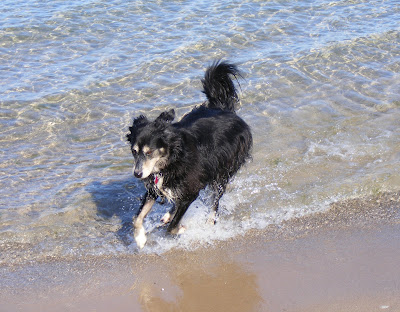
The other day I wrote a one-sentence post that implied conceptual thinking on the part of my dog. Being a philosopher, I gave careful consideration to that sentence but in the end decided to invoke literary license.
It was only one day later that I idly picked up The Philosopher’s Dog: Friendships with Animals, by Raimond Gaita. Had I read the book? Surely I would have. Opening it at the beginning pages cast doubt on my certainty, and further reading convinced me of my error. This book doesn’t belong in the pet section of the bookstore at all but on the philosophy shelves! But I couldn’t resist. I had to read more before reshelving.
Dog lovers without philosophical inclinations would find long stretches of this book tedious, but every page is interesting to me, for various reasons. For instance, Gaita quotes a long passage from J. M. Coetzee’s The Lives of Animals and subsequently makes a distinction between practical awareness and reflective understanding. If people think that dogs, let’s say, do not possess concepts, then how can they say a dog anticipates a future event? Isn’t the dog trapped in a never-ending NOW, without past or present? Gaita writes,
Coetzee appears to challenge that assumption. He also challenges assumptions about the connection between our sense of an animal’s body and of its behavior and our unhesitating preparedness to say that animals believe this or know that. He urges us to attend to the role that the living body, the body of flesh and blood, plays in the constitution of our concepts, including our concepts of belief and knowledge. Like Wittgenstein, he seems to believe that we misunderstand the importance of the infinitely subtle inflections and demeanors of the body, the many forms of its expressiveness, if we take them only as the basis for hypothetical attributions of states of consciousness....
Gaita’s last two words in the sentence I have let tail off with an ellipse are “to animals.” I stopped short of the end of his sentence because I think the case can be made—and that Wittgenstein implied the case—for humans as well as nonhuman animals.
The room Gaita makes for practical awareness falling short of reflective understanding reminds me of an old favorite paperback of mine, From Fish to Philosopher. Why is it so tempting for human beings to think that conscious must be all or nothing? If that’s your assumption, the doctrine of innate ideas makes perfect sense, eliminating any otherwise necessary leap over the chasm from nothing to all. Gaita dissolves the pseudo-problem of dog consciousness in Wittgensteinian fashion: it is not that we have justification for believing dogs conscious but rather that doubting the matter makes no sense. Belief comes before doubt, or doubt itself makes no sense.
My feeling—call it just that—about arguments for strong determinism is in this same boat. The determinist argues that we could predict every event in the future, given infinite knowledge of the past and present. But the very nature of argument rests on the possibility of convincing, of changing a listener’s or reader’s mind, and if determinism were true, the change in or persistence of belief would, either way, be inevitable. Does this possibility cohere with what we take belief to be? The arguer himself would be determined, not reasoned, in every word he utters. Is this what we take argument to be?
I no longer argue determinism, nor do I debate whether or not dogs are conscious, sentient beings who [yes, that's what I mean] feel pain, joy, satisfaction, who [not "that"] dream and anticipate. There is plenty of room for doubt in this world, but I’m saving my doubt for matters where it makes some sense. That’s one luxury of being a bookseller instead of an academic philosopher.

6 comments:
I adore this picture of Sarah! As the Poles would say "How baby!" I say of her, "How dog!"
Laurita! C'est toi? I love the expression "How baby!" It so captures how we feel about our dogs, doesn't it?
I'm going to adopt your philosophy of philosophy. Doubt is very useful, but not much help in relationships. And close, meaningful, conscious relationships are what we have with our dogs. Though not, perhaps, with the yappy little twits over on the woods road.
I have a hard time with yapping, too. But then, sometimes Sarah must wonder why I talk so much, especially when it's just the two of us and we could easily be communing in silence. The gift of silence! I must give it more often!
Katie, on the other hand, has NO problem with Yapping. And never seems tired of watching me talk. Especially if it's possible that the talk might turn into walks in the park or treats. Or both.
Glad you guys got a day off! Sarah looks very engaged! What was she watching? Or was she just ready to GO GO GO!?
Dawn, I must confess. The picture at the end of the post is from last year after one of our expeditions to Peterson Park. If I remember correctly, Sarah was intently observing wild turkeys. Or maybe that was another time. Maybe she was just all perked up from running in and out of the water.
Post a Comment